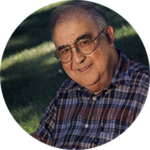
Hy Berman was known internationally as an expert on Labor History. He was also a leader in the development of Jewish Studies. In Minnesota he was often referred to as our State Historian as he spoke on public radio and television about the history of Minnesota politics and the relationship between Labor History and Immigrant History in Minnesota, especially on the Iron Range.
Hy Berman’s books were donated to the East Side Freedom Library by his family after his death on November 29th, 2015. His collection includes books about Labor History, Immigration History, Jewish History, and Minnesota History. His own writings include The American Worker in the 20th Century (with Eli Ginzberg, 1963), Political Antisemitism in Minnesota during the Great Depression (1979), Jews in Minnesota (with Linda Mack Schloff, 2002). The University of Minnesota Press published Professor Berman: The Last Lecture of Minnesota’s Greatest Public Historian edited by Jay Weiner in November 2019.
Hy was born February 20, 1925 in New York City to David and Yetta Berman. His parents were Polish Jewish Immigrant garment workers who lived in the Bronx, according to the 1930 Federal Census Records. David and Yetta were active in the garment workers’ labor movement until they were forced out of Amalgamated Clothing Workers’ of America union because David Berman led the left wing opposition against the leadership. By 1940 David Berman was running a Candy Store in the Bronx. In his Immigrant and Labor History lecture about the garment industry in New York City Hy said that when the left wing was pushed out of the union many of them became left wing Jewish chicken farmers. His parents lived on a chicken farm after World War II in the area around Toms River-Lakewood, New Jersey. Hy spent weekends on the chicken farm while he was attending college.
Hy went to Stuyvesant High School in Manhattan. He served in the United States Army during World War II. He was stationed at several bases around the United States. After the war Hy used the GI Bill to study chemistry at the City College of New York until he had an epiphany and changed his major to history. After graduating from the City College of New York in 1948 he went on to get his PhD from Columbia University in 1956.
While he was studying at Columbia he was an instructor at City College of New York, a research assistant, and he taught social science courses to cantorial students at Hebrew Union College. After receiving his PhD he was an instructor at Brooklyn College. In 1960 he was hired as an Assistant Professor at Michigan State University. He joined the faculty at the University of Minnesota in the Social Science Program and the History Department in 1961. He was appointed a Full Professor in 1970 and retired in 2004. In the University of Minnesota History Department he is remembered for teaching Labor History, Minnesota History, Jewish History, and Holocaust History classes.
While Hy was at the University of Minnesota he helped with the creation of Afro-American Studies, American Indian Studies, Chicano Studies, Criminal Justice Studies, Jewish Studies, and Industrial Relations. His work with his history colleagues on the Iron Range led to the formation of the Immigration Research Center at the University of Minnesota. He took leaves to teach in various places including Osmania University in Hyderabad, India (1964), Berkeley (1967-1968), China (First time 1981), and Munich (1984).
You can find more about Professor Berman from appreciations which were written after his death, such as https://www.workdayminnesota.org/articles/labor-historian-hy-berman-left-his-mark-minnesota and https://www.minneapolisunions.org/mlr2015-12-18_berman.php. You can read the interview he did with Professor Clark Chambers in 1984 at https://conservancy.umn.edu/handle/11299/48992.
I had the good fortune to have the Bermans as neighbors and to study with Professor Berman at the University of Minnesota. My freshman year he taught the second half of the American History survey class. As a History Major I took his US History from 1917 to 1945 class. My interest in Immigration History goes back to my childhood as I remember Professor Berman giving his children and me a history lesson about why Jewish people and Irish Catholics immigrated to The United States and how they had been treated because of their faith. He was convinced that people would find history interesting when they could see how it related to their family stories.
Alison Emery